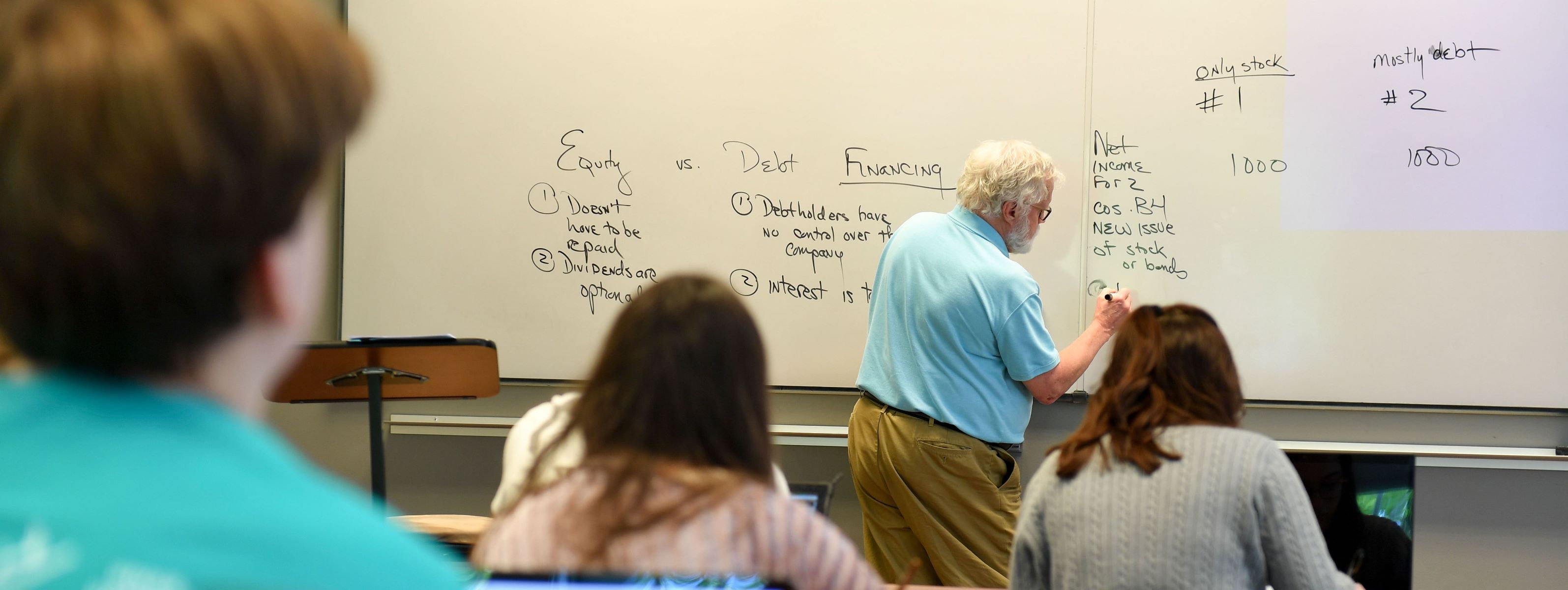

Finance
How To Become Accounting Professor
Published: October 6, 2023
Discover the steps to becoming an Accounting Professor in the field of Finance. Gain valuable insights and expertise to excel in academia and inspire future financial professionals.
(Many of the links in this article redirect to a specific reviewed product. Your purchase of these products through affiliate links helps to generate commission for LiveWell, at no extra cost. Learn more)
Table of Contents
- Introduction
- Education and Qualifications
- Obtaining a Bachelor’s Degree in Accounting
- Pursuing a Master’s Degree in Accounting
- Earning a Doctorate Degree in Accounting or a Related Field
- Gaining Professional Experience in Accounting
- Developing Teaching Skills
- Building a Strong Publication Record
- Networking and Collaborating with Other Professionals
- Applying for Academic Positions
- Continuing Professional Development
- Conclusion
Introduction
Are you passionate about numbers, financial analysis, and teaching? If so, becoming an accounting professor might be the perfect career path for you. Accounting professors play a vital role in educating and shaping the minds of future accountants and finance professionals. They not only teach students the fundamentals of accounting but also inspire them to think critically and develop analytical skills.
Being an accounting professor offers numerous rewards, including the opportunity to contribute to the field of accounting through research and publications. It also provides a platform to interact with students, fellow faculty members, and industry professionals, fostering a rich learning environment.
In this article, we will guide you through the steps to becoming an accounting professor, from obtaining the necessary education and qualifications to building a strong publication record and applying for academic positions. Whether you are just starting your educational journey or are already working in the accounting field and considering a transition into academia, this article will provide you with the insights you need to pursue a career as an accounting professor.
Before we delve into the specific steps, it’s important to note that the path to becoming an accounting professor requires a solid foundation in both academic qualifications and professional experience. While the exact requirements may vary depending on the institution and country, the following sections will outline the general steps to follow.
So, if you’re ready to embark on this fulfilling career path, let’s dive into the educational and professional requirements to become an accounting professor!
Education and Qualifications
Obtaining the necessary education and qualifications is the first step towards becoming an accounting professor. While specific requirements may vary depending on the institution, country, and level of teaching, there are some common educational milestones to consider.
Bachelor’s Degree in Accounting: The journey typically begins with earning a bachelor’s degree in accounting or a related field. This undergraduate program will provide you with a solid foundation in accounting principles, financial reporting, taxation, and auditing. It is essential to choose an accredited institution that offers a reputable accounting program.
Master’s Degree in Accounting: Pursuing a master’s degree in accounting can enhance your knowledge and specialization. Many universities offer specialized master’s programs such as Master of Accounting (MAcc) or Master of Science in Accounting (MSA). These programs often cover advanced topics in accounting, research methods, and allow for more in-depth analysis of financial statements and tax regulations.
Doctorate Degree in Accounting or a Related Field: While a master’s degree may be sufficient to teach at some community colleges or trade schools, a doctorate degree is often required for tenure-track positions at universities or for higher-level teaching in prestigious institutions. A Ph.D. in Accounting or a related field will involve advanced coursework, research activities, and the completion of a dissertation on a specialized accounting topic.
It’s important to note that pursuing a doctorate degree requires a significant investment of time and dedication. However, it opens doors to research opportunities, academic recognition, and higher positions within academia.
In addition to formal education, obtaining relevant certifications can demonstrate your commitment and expertise in specific accounting areas. For example, earning a Certified Public Accountant (CPA) designation can add value to your teaching credentials and provide practical insights into the industry.
Furthermore, staying updated with industry developments and changes in accounting standards is crucial. It’s beneficial to participate in continuing professional education (CPE) programs, attend conferences, and become a member of professional accounting organizations, such as the American Institute of Certified Public Accountants (AICPA) or the Association of Chartered Certified Accountants (ACCA).
By acquiring the necessary educational qualifications and staying current in the accounting field, you will establish a strong foundation for a successful career as an accounting professor. In the next section, we will explore how gaining professional experience in accounting can further enhance your credibility and expertise.
Obtaining a Bachelor’s Degree in Accounting
Obtaining a bachelor’s degree in accounting is the first step towards building a career as an accounting professor. This undergraduate program provides you with fundamental knowledge and skills in accounting principles, financial reporting, taxation, and auditing.
When choosing a bachelor’s degree program in accounting, it is crucial to select an accredited institution that offers a reputable accounting program. Accreditation ensures that the program meets specific standards of quality and helps validate your degree in the job market.
The curriculum of a bachelor’s degree in accounting typically includes a range of courses that cover various aspects of accounting. Some of the common subjects you can expect to study include financial accounting, managerial accounting, taxation, auditing, business law, economics, and finance.
In addition to accounting-specific courses, a bachelor’s degree program may also include general education courses to provide a well-rounded education. These courses may cover subjects such as mathematics, statistics, communication, and social sciences.
During your undergraduate program, it’s beneficial to take advantage of internships or part-time jobs in accounting firms or corporate finance departments. These experiences will allow you to gain practical exposure, learn about real-world accounting practices, and build professional networks.
Moreover, participating in extracurricular activities, such as joining accounting or finance clubs, can provide opportunities for networking with peers who share similar interests. These clubs often organize events, workshops, and guest speaker sessions, allowing you to expand your knowledge beyond the classroom.
To make the most out of your bachelor’s degree program, it’s important to actively engage with the coursework and seek guidance from your professors. They can provide valuable insights, mentorship, and even connect you with industry professionals.
Upon completion of your bachelor’s degree in accounting, you will have a solid foundation in accounting principles and concepts. However, a bachelor’s degree alone may not be sufficient for higher-level teaching positions or tenure-track positions at universities. To pursue those opportunities, you may need to further your education by pursuing a master’s degree or a doctorate degree in accounting or a related field.
In the next section, we will discuss the importance of pursuing a master’s degree in accounting to advance your career as an accounting professor.
Pursuing a Master’s Degree in Accounting
Pursuing a master’s degree in accounting can greatly enhance your knowledge and expertise in the field, opening doors to advanced teaching opportunities and career advancement. A master’s degree program allows you to specialize in specific areas of accounting and gain a deeper understanding of advanced accounting topics.
When considering a master’s degree in accounting, it is important to choose an accredited institution that offers a reputable program. Look for universities that are well-known for their accounting department and have a strong track record of producing successful graduates.
The curriculum of a master’s degree program in accounting typically includes advanced courses that delve into complex accounting concepts and practices. Some common subjects you may encounter during your master’s program include advanced financial accounting, tax planning and strategy, forensic accounting, auditing theory, and managerial accounting.
In addition to core accounting courses, master’s programs often provide opportunities for specialization. You may have the option to focus on areas such as taxation, financial analysis, auditing, or corporate accounting. Choosing a specialization can help you develop expertise in a specific area and make you a valuable resource in that particular field.
One of the key benefits of pursuing a master’s degree in accounting is the exposure to research and academic writing. Many programs require students to complete a thesis or research project, allowing you to explore a specific accounting topic in-depth and contribute to the existing body of knowledge. This research experience can be instrumental when transitioning into an academic career as an accounting professor.
Furthermore, pursuing a master’s degree in accounting allows you to network with fellow students, faculty members, and professionals in the accounting industry. Take advantage of networking opportunities within your program, such as attending guest lectures, joining accounting student organizations, and participating in internship programs. Building a strong professional network can provide access to job opportunities, collaborations, and mentorship from experienced professionals.
While a master’s degree is not always required to teach at community colleges or trade schools, it can significantly enhance your credibility and marketability for teaching positions at universities and higher-level institutions. If your long-term goal is to secure a tenure-track position or to climb the academic ladder, a master’s degree in accounting is often a prerequisite.
In the next section, we will explore the option of pursuing a doctorate degree in accounting or a related field to further advance your career as an accounting professor.
Earning a Doctorate Degree in Accounting or a Related Field
Earning a doctorate degree in accounting or a related field is the highest level of educational achievement in academia and offers numerous opportunities for career advancement as an accounting professor. A doctoral program provides rigorous training in research, critical thinking, and academic writing, preparing you to contribute to the field of accounting through original research and publications.
When considering a doctorate degree, it’s important to select a program that aligns with your research interests and career goals. Look for reputable universities that offer strong doctoral programs in accounting or related fields such as finance, economics, or business administration.
The curriculum of a doctorate program in accounting typically consists of a combination of advanced coursework, comprehensive exams, and dissertation research. The coursework covers foundational theories and methodologies in accounting research, advanced statistical analysis, and specialized topics relevant to your research interests.
The highlight of a doctoral program is the dissertation. This research project allows you to explore a specific research question, generate new knowledge, and contribute to the academic community. Your dissertation will involve conducting a comprehensive literature review, developing a research framework, collecting and analyzing data, and presenting your findings in a scholarly manner.
During your doctoral studies, it is crucial to engage in research opportunities and collaborate with faculty members and fellow doctoral students. This collaboration can enhance your research skills, expose you to different perspectives, and expand your network within the academic community.
In addition to coursework and research, doctoral programs often offer opportunities to gain teaching experience. Teaching assistantships allow you to work closely with experienced professors, assist in delivering lectures, grading assignments, and even teaching your own classes. This hands-on teaching experience is valuable for future teaching positions as an accounting professor.
Earning a doctorate degree requires a significant commitment of time and effort. It can take several years to complete the program, including the research and dissertation phase. However, the benefits of holding a doctorate degree can be substantial. It opens doors to prestigious academic positions, research grants, consulting opportunities, and leadership roles within the field of accounting.
Furthermore, earning a doctorate degree in accounting demonstrates your expertise and credibility in the field, which can attract recognition from professional accounting organizations and make you a sought-after contributor to academic publications and conferences.
In the next section, we will explore the importance of gaining professional experience in accounting and how it can complement your academic qualifications as an accounting professor.
Gaining Professional Experience in Accounting
While obtaining the necessary education and qualifications is crucial for becoming an accounting professor, gaining professional experience in the accounting field is equally important. Professional experience not only enhances your understanding of practical accounting principles but also provides valuable insights that can be applied in the classroom and shared with students.
One of the most common ways to gain professional experience in accounting is by working in an accounting firm. Starting your career as an accountant in a public accounting firm such as the Big Four (Deloitte, PricewaterhouseCoopers, Ernst & Young, and KPMG) or a regional accounting firm can provide you with a well-rounded perspective on various areas of accounting, including auditing, taxation, and financial consulting.
Working in an accounting firm allows you to apply the theoretical knowledge gained during your educational journey to real-world scenarios. You will gain hands-on experience in preparing financial statements, conducting audits, analyzing tax regulations, and providing valuable financial advice to clients.
Another option for gaining professional experience is to work in the accounting or finance department of a corporation. Many organizations, both large and small, have in-house accounting teams responsible for managing their financial records, preparing reports, and ensuring compliance with accounting standards. Working in such a role can provide you with insights into how accounting functions within specific industries and give you exposure to complex accounting issues faced by companies.
Additionally, consider pursuing internships or cooperative education programs during your education. These opportunities allow you to gain practical experience while still completing your degree. Internships can be a valuable stepping stone towards securing a full-time position as an accountant and can help you develop important skills such as communication, teamwork, and problem-solving.
While professional experience is crucial, it’s important to note that the length and specific type of experience required to become an accounting professor can vary depending on the institution and position. Some teaching positions may require a minimum number of years of professional experience, while others may prioritize research and academic achievements. It is essential to research the specific requirements and expectations of the institutions or academic programs you are interested in.
Overall, gaining professional experience in accounting allows you to bring real-world context to your teaching and research. It enhances your credibility as an accounting professor and allows you to share practical examples, case studies, and insights from your professional experience with students.
In the next section, we will discuss how developing teaching skills can further strengthen your qualifications as an accounting professor.
Developing Teaching Skills
To excel as an accounting professor, it is crucial to develop strong teaching skills that engage and inspire students. While your academic qualifications and professional experience are important, effective teaching goes beyond simply imparting knowledge. It involves creating an inclusive and interactive learning environment that fosters critical thinking, problem-solving, and the development of essential accounting skills.
Here are some key steps to help you develop your teaching skills:
1. Pursue Teaching Workshops and Programs: Many universities and professional organizations offer teaching workshops and programs specifically designed for educators. These opportunities cover a range of topics, including instructional methods, assessment techniques, classroom management, and student engagement strategies. Taking advantage of these resources can provide valuable insights and practical techniques to enhance your teaching abilities.
2. Seek Mentorship from Experienced Faculty Members: Collaborate with experienced accounting professors who have a strong track record in teaching. They can provide mentorship, guidance, and valuable feedback to help you refine your teaching style. Observe their classes, hold discussions, and seek their advice on effective teaching techniques.
3. Incorporate Active Learning Strategies: Engage students through active learning methods such as case studies, group discussions, problem-solving exercises, and role plays. These hands-on activities encourage students to apply accounting concepts in real-world scenarios, fostering deeper understanding and critical thinking skills.
4. Use Technology Effectively: Embrace technology tools and platforms that enhance the learning experience. Utilize interactive presentations, online learning platforms, and accounting software to create dynamic and immersive classroom experiences. Encourage students to leverage technology for research, data analysis, and financial modeling.
5. Provide Constructive Feedback: Regularly assess student progress and provide constructive feedback to help them improve. Encourage open communication and create a supportive environment where students feel comfortable asking questions and seeking clarification.
6. Stay Current with Teaching Best Practices: Keep abreast of the latest teaching methodologies and pedagogical research in accounting education. Attend conferences, read academic publications, and participate in teaching-focused communities to stay updated on emerging trends and innovative approaches in accounting education.
7. Reflect and Iterate: Continuously reflect on your teaching practices and seek opportunities for improvement. Collect student feedback, evaluate the effectiveness of different teaching strategies, and make adjustments accordingly. Embrace a growth mindset and always strive to enhance your teaching skills.
Remember, developing teaching skills is an ongoing process that requires dedication, reflection, and a genuine passion for educational excellence. By continually enhancing your teaching abilities, you can create impactful learning experiences for your students and make a lasting impact in the field of accounting education.
In the next section, we will explore the importance of building a strong publication record as an accounting professor.
Building a Strong Publication Record
Building a strong publication record is crucial for establishing your reputation and expertise as an accounting professor. Research publications contribute to the advancement of accounting knowledge and demonstrate your ability to contribute to the academic community. A robust publication record also enhances your credibility as a researcher and can lead to additional career opportunities and collaborations.
Here are some steps to help you build a strong publication record:
1. Conduct Original Research: Identify research areas within accounting that align with your interests and expertise. Conduct thorough literature reviews to identify gaps in existing knowledge and formulate research questions that will contribute to the field. Develop a research plan and methodology to guide your investigation.
2. Publish in Peer-Reviewed Journals: Seek publication opportunities in respected, peer-reviewed accounting journals. These journals have rigorous submission and review processes to ensure the quality and credibility of the research they publish. Consult the journal’s guidelines and adhere to their formatting and submission requirements.
3. Collaborate with Other Researchers: Collaborating with other accounting professionals and academics can enhance the quality and impact of your research. Seek opportunities to collaborate on research projects, co-author papers, or participate in research seminars. Leverage networks and attend conferences to connect with potential collaborators.
4. Present Research at Conferences: Academic conferences provide platforms to present your research findings, receive feedback, and engage in valuable discussions with peers in the accounting field. Submit abstracts or papers to relevant conferences and actively participate in panel discussions and Q&A sessions.
5. Write Book Chapters and Review Articles: Contributing book chapters or review articles allows you to showcase your expertise in a specific area of accounting. These publications provide a comprehensive overview of a topic, synthesize existing research, and offer new insights, establishing you as a thought leader within the field.
6. Maintain a Research Agenda: Develop a long-term research agenda that outlines your research goals and timelines. This will help you stay focused, plan your research activities, and ensure a steady flow of research output. Balancing your teaching responsibilities and research commitments is essential to maintain productivity.
7. Seek Feedback and Revise Accordingly: Submitting your research for peer review can be a rigorous process, but it is crucial for improving the quality of your work. Embrace feedback from reviewers and make necessary revisions to enhance the clarity, rigor, and validity of your research. Seek guidance from experienced researchers and mentors to help refine your papers.
8. Stay Informed about Publishing Trends: Stay updated on emerging trends and publishing practices in the field of accounting. Familiarize yourself with open-access publishing, interdisciplinary research opportunities, and new methodologies in accounting research. Adapting to changing publication trends can broaden your reach and impact as a researcher.
Building a strong publication record takes time and perseverance. Aim to publish regularly, but also prioritize the quality and impact of your research. Remember, a strong publication record not only enhances your reputation but also contributes to the advancement of the accounting profession.
In the next section, we will discuss the importance of networking and collaborating with other professionals in the accounting field.
Networking and Collaborating with Other Professionals
Networking and collaborating with other professionals in the accounting field are essential steps in expanding your knowledge, enhancing your career prospects, and staying connected within the academic community. By building meaningful relationships with fellow professionals, you can foster collaborations, gain new perspectives, and open doors to exciting opportunities.
Here are some key strategies to help you network and collaborate effectively:
1. Attend Conferences and Workshops: Academic conferences and workshops are excellent platforms to meet and connect with other accounting professionals. Engage in discussions, attend presentations, and participate in networking events to introduce yourself, exchange ideas, and form connections. These events often attract experts in the field, offering valuable opportunities for collaboration.
2. Join Professional Organizations: Become a member of professional accounting organizations such as the American Accounting Association (AAA) or the International Federation of Accountants (IFAC). These organizations provide access to networking events, workshops, and publications, allowing you to connect with leaders and researchers in the field.
3. Engage in Online Communities: Participate in online forums, discussion boards, and social media groups focused on accounting education and research. These virtual communities allow you to connect with individuals who share similar interests, exchange ideas, share resources, and collaborate on research projects.
4. Collaborate on Research Projects: Seek opportunities to collaborate with other accounting professionals on research projects. Collaborative research allows you to leverage diverse perspectives, share expertise, and enhance the impact of your work. Reach out to researchers whose work aligns with your interests and explore potential collaborations.
5. Publish and Present Jointly: Co-authoring research papers with other professionals can enhance the credibility and visibility of your work. Seek opportunities to publish and present jointly, allowing you to tap into the networks and expertise of your co-authors. This collaborative approach can also lead to more robust research findings and a broader audience for your work.
6. Seek Mentorship: Identify experienced professionals in the field who can serve as mentors. Mentors can provide guidance, support, and valuable insights based on their own experiences. Building a mentoring relationship can help you navigate through challenges, develop your skills, and expand your professional network.
7. Engage in Service Activities: Participate in service activities within professional organizations or academic institutions. Volunteer to serve on committees, review research papers, or organize conferences. These activities provide opportunities to collaborate with other professionals and contribute to the accounting community, further expanding your network.
8. Maintain Professional Relationships: Networking is an ongoing process, and it is essential to nurture and maintain professional relationships. Stay in touch with colleagues, mentors, and collaborators by attending professional events, sharing updates on your research, and offering support when needed.
Remember, effective networking and collaboration are built on mutual respect, shared interests, and a willingness to contribute to each other’s growth and success. By actively engaging in networking activities and fostering collaborations, you can strengthen your professional connections and enhance your career opportunities as an accounting professor.
In the next section, we will discuss the crucial steps to consider when applying for academic positions in the accounting field.
Applying for Academic Positions
When you have acquired the necessary qualifications and developed a strong foundation in accounting, the next step is to apply for academic positions in the field. Whether you are seeking a teaching position at a community college, a tenure-track position at a university, or a research-focused role, your application should showcase your expertise, teaching abilities, and research potential.
Here are some essential steps to consider when applying for academic positions:
1. Tailor Your Application: Customize your application materials, including your curriculum vitae (CV) and cover letter, to highlight your qualifications and alignment with the specific position. Emphasize relevant teaching experience, research interests, and any publications or presentations.
2. Highlight Teaching Effectiveness: Provide evidence of your teaching effectiveness, such as teaching evaluations, teaching philosophy statements, or letters of recommendation from students or colleagues. Demonstrate your commitment to student learning, innovative teaching methods, and your ability to engage and inspire students.
3. Showcase Research and Publications: Highlight your research contributions and publications in reputable journals. Include a list of your published papers, conference presentations, and any ongoing or future research projects. Discuss how your research aligns with the goals and focus of the institution you are applying to.
4. Emphasize Service and Engagement: Highlight any service activities you have been involved in, such as committee work, professional organizations, or community engagement. Demonstrating your commitment to service and your ability to contribute to the broader academic community can be valuable in academic job applications.
5. Prepare a Teaching Portfolio: Create a teaching portfolio that captures your teaching philosophy, course syllabi, examples of assignments and assessments, and any teaching-related materials that highlight your pedagogical approach and expertise. A comprehensive teaching portfolio can provide evidence of your teaching abilities to potential employers.
6. Obtain Strong Letters of Recommendation: Request letters of recommendation from mentors, professors, or supervisors who can speak to your qualifications and potential as an accounting professor. Choose individuals who can provide detailed insights into your teaching, research, and professional abilities.
7. Research the Institution: Familiarize yourself with the institution you are applying to, including its mission, values, and focus areas. Tailor your application to demonstrate how your teaching and research align with the institution’s goals and how you can contribute to its academic community.
8. Apply Early and Follow Application Procedures: Always adhere to application deadlines and follow the specific procedures outlined by the institution. Submit your application materials early to avoid last-minute complications or technical issues.
9. Prepare for Interviews: If you are shortlisted for an interview, be prepared to discuss your teaching approach, research interests, and your fit within the institution’s culture. Familiarize yourself with the institution’s curriculum and programs, and be ready to articulate your teaching philosophy and research plans.
10. Seek Feedback and Learn from Rejections: Receiving rejection letters is a normal part of the application process. Take these rejections as opportunities to learn and seek feedback. Use the feedback to improve your application materials and enhance your qualifications as you continue your academic job search.
Applying for academic positions in accounting requires careful preparation, a tailored approach, and strong documentation of your qualifications and experiences. By effectively presenting your teaching abilities, research accomplishments, and commitment to the field, you can increase your chances of securing a position as an accounting professor.
In the next section, we will discuss the importance of continuing professional development to stay relevant and enhance your career as an accounting professor.
Continuing Professional Development
Continuing professional development is crucial for accounting professors to stay relevant, enhance their skills, and contribute to the advancement of the accounting field. As accounting practices and technologies evolve, it is essential to engage in lifelong learning and professional growth to provide up-to-date knowledge and resources to students and colleagues.
Here are some key elements to consider when engaging in continuing professional development:
1. Stay Updated with Current Developments: Keep abreast of the latest trends, regulations, and advancements in the accounting industry. Subscribe to reputable accounting journals, attend professional conferences, and participate in webinars or workshops focused on emerging accounting practices and technologies.
2. Pursue Specialized Training and Certifications: Enhance your expertise in specific accounting areas by pursuing specialized training and certifications. For example, you can pursue certifications such as Certified Management Accountant (CMA), Certified Internal Auditor (CIA), or Certified Fraud Examiner (CFE) to deepen your knowledge and credibility in those domains.
3. Engage in Research and Publishing: Continually engage in research activities to expand your knowledge and contribute to the accounting literature. Publish research papers to share your findings and insights with the broader academic community. Actively seek opportunities to collaborate with other researchers, attend research conferences, and participate in research-focused workshops.
4. Expand Your Teaching Methods: Explore innovative teaching methods and technologies to enhance student engagement and learning outcomes. Incorporate new approaches such as flipped classrooms, online learning platforms, and interactive multimedia to adapt to the evolving needs of students. Attend workshops or training sessions on pedagogical best practices to refine your teaching skills.
5. Seek Feedback and Peer Collaboration: Regularly seek feedback from students, fellow faculty members, and mentors to improve your teaching effectiveness. Collaborate with colleagues to share best practices, exchange ideas, and learn from each other’s experiences. Participate in faculty development programs or teaching circles that foster a culture of collaboration and professional growth.
6. Mentor and Support Junior Faculty: Share your expertise and experiences by mentoring junior faculty members. Provide guidance, support, and opportunities for collaboration to help them develop their teaching and research skills. Actively contribute to the growth and development of the accounting teaching community.
7. Embrace Technology and Data Analytics: Keep up with advancements in technology and data analytics that are transforming the accounting profession. Familiarize yourself with accounting software, data visualization tools, and data analytics techniques to integrate them into your teaching and research. Stay current with emerging technologies relevant to the field.
8. Engage in Leadership and Service: Take on leadership roles within your academic institution or professional organizations. Participate in committees, contribute to accreditation processes, and engage in volunteer service that advances the accounting profession. Leadership and service opportunities provide avenues for professional growth and making a positive impact within the accounting community.
Continuing professional development is an ongoing commitment to staying current, expanding skills, and fostering excellence in the field of accounting education. By actively engaging in professional development activities, accounting professors maintain their credibility, enhance their teaching and research abilities, and contribute to the ongoing development of the accounting profession.
In the final section, we will summarize the key points discussed in this article on becoming an accounting professor.
Conclusion
Becoming an accounting professor is an enriching and fulfilling career choice that combines your passion for accounting, teaching, and research. To embark on this journey, it is essential to obtain the necessary education and qualifications, including a bachelor’s degree, master’s degree, and possibly a doctorate degree in accounting or a related field.
Gaining professional experience in the accounting industry provides valuable insights and practical knowledge that can be brought into the classroom. Developing strong teaching skills, such as incorporating active learning strategies and leveraging technology, enhances your ability to engage and inspire students.
Building a strong publication record through research and collaborations showcases your expertise and contributes to the advancement of the accounting field. Networking and collaborating with other professionals, both within academia and the industry, expands your knowledge, provides opportunities for collaboration, and fosters professional growth.
Continuing professional development is crucial for accounting professors to stay relevant, adapt to industry changes, and enhance their teaching and research skills. Engaging in lifelong learning, pursuing specialized training, and staying updated with current developments are essential elements of professional growth.
In conclusion, becoming an accounting professor requires a combination of educational qualifications, professional experience, teaching skills, research contributions, and ongoing professional development. By following these steps and actively engaging in the field, you can become a successful accounting professor, impacting the lives of students, contributing to the accounting community, and advancing the field of accounting.














